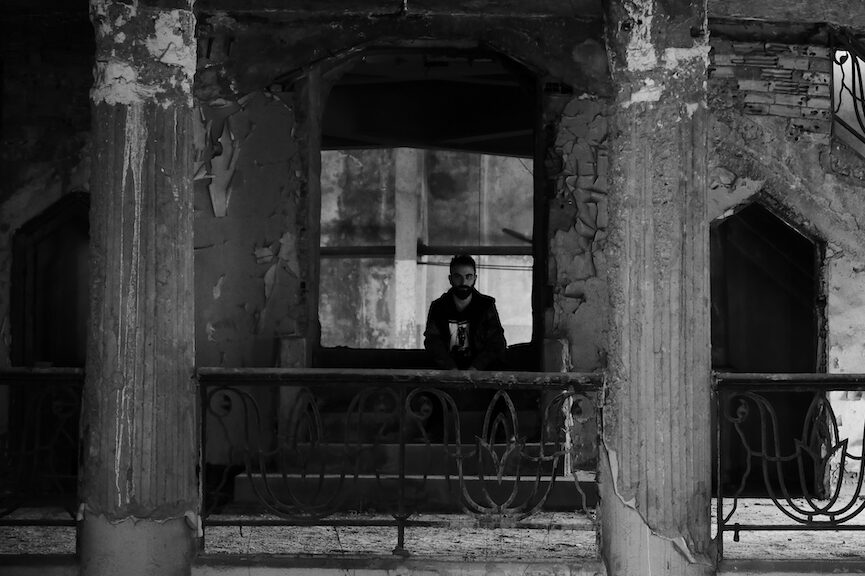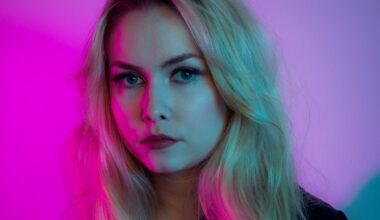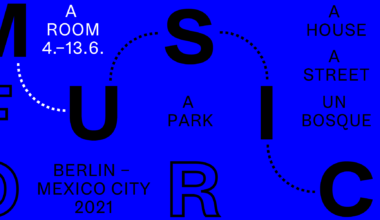The Rebels Have No King is a report on the current human condition, a decade long interpretation by Kujo. This magnum opus expressed in trinity form (of audio, image, and text) invites the subject to partake in a boundless experiment that brings forth the voices of the unheard with cross-cultural interpretation between Middle Eastern and Western schools. Unapologetic by nature, the execution of these 9 recordings showcase a raw and direct connection to the artist, disembodying the persona. Each piece is riddled with complex human interaction and memory capsules of events occuring in contemporary times channeled in form of outcries. In classic Kujo fashion the weapons of choice are a pallet of haunting vocals, synthesizer noise and oriental percussion, recorded soundscapes of protesting under teargas rainfall, projecting you straight to the frontline.
FACTS
1. The human condition is suffering by nature and we work to make it better. Assuming that you are uniquely a victim is futile, humans are born victims. Adversity makes us stronger.
2. Freedom of Speech and Freedom of Expression are staples of modern society, no governing body should have an authority on limiting speech because no governing body is morally divine. Accepting any form of censorship is setting a precedent for that authority to censor the next thing, which you will have no control over anymore since what you have lobbied for is now implemented in the system and can be used as a tool for oppression. Ideas cannot be censored, only public speech. By censoring you are creating an underground that may breed extremism and polarization since it happens away from the public eye. You also shouldn’t assume that anybody should be protected from certain speech because that requires the assumption that you are smarter than them and know what information they best be exposed to or not. The free flow of ideas and the ability to have them challenged creates a better, freer and more diverse society than one that silences and censors what it disagrees with, and by definition anti-diverse since it restricts diverse perspective and schools of thought rather than encourage.
3. The Palestinians are not free, they live in an apartheid state and their lives are considered cheaper than their counterparts. Once the world powers and Zionists stop dehumanizing Palestinian lives will we see this 80 year long war crime for what it truly is.
QUESTIONS
1. What is the biggest inspiration for your music?
The current human condition and conflict are not only the inspiration but also the reason for my music.
2. How and when did you get into making music?
The creation happened like a slow burn over a decade. Like metamorphosis, happening through multiple stages. As I was growing up in Beirut the omnipresent emotional discord that came with post-war social values made it crippling to create. Yet it provided a tapestry emotions to be expressed [at a later time].
In my later years, self hate and deprecation slowed down my process but gave way for an emotional maturity to take develop.
The lack of worth in my self as an artist (who am I to pretend I am an artist?) was in conflict with the fierce conviction that what I had inside of me needed to be expressed, resulting in some years passing by with me attempting to sound like someone who I wasn’t an indirect attempt at belonging and being accepted. Years had gone by and I had witnessed, experienced a wider spectrum of the current human condition, and so after observing I started reporting and interpreting. I realised that my vocation will never be easy to listen to and I couldn’t sound like others because we created music for different reasons and we had been through different things in life.
I then ignored the trends and stopped being concerned with others and spent that time developing my own interpretation and world since my creation didn’t stop with music, it was a part of the emotional message that I am attempting to convey but not its entirety.
3. What are 5 of your favourite albums of all time?
Me – I hate this question (2021)
Haus Arafna – You (2010)
Tool – Aenima (1996)
SPK – Leichenschrei (1982)
Oxmo Puccino – Opera Puccino (1998)
4. What do you associate with Berlin?
History and Cultural Freedom
5. What’s your favourite place in your town?
Hajj Nasr sandwich place, walking back home in Sassine (Beirut, Lebanon) with my friend Gabi and seeing that place open means we’re gonna eat Kafta and T7al (maybe Sawdit Djeij also). That moment never dies, the place opens up at 4am and start making food for the late night/early morning ghouls and is often out of food by mid-day. It unifies and summons all socio-economical entities under one bread roll (I hope to achieve the same as Hajj Nasr did with his sandwich but with my music).
6. If there was no music in the world, what would you do instead?
A conflict/war journalist, I find it calling me often. It is something that I am close with in my music creation. My grandfather was a journalist and the value of his documentation and archiving is of the utmost important for the region (The Middle East) that has had a lot of cultural and power shifts.
You can witness in my photography, videos, and sampling in music that it is often done in a manner reminiscent of journalistic intent.
7. What was the last record/music you bought?
Daboor – El Gad3ana EP الجدعنة
8. Who would you most like to collaborate with?
Dominick Fernow mostly under Vatican Shadow but also Prurient.
9. What was your best gig (as performer or spectator)?
As a performer, the second time in Seoul, South Korea for Constant Value under the Modular Mind showcase in 2018. (Ironically followed by my worse show at De School in Amsterdam just a week later haha)
The union and meaningfulness of that show represented what I strive for, authenticity could be found in the audience’s love for such a moment to exist and same went to the performers and crew that put this together, a sense of freedom for us to be allowed to express ourselves freely as performers or as dancers and creators. Each artist sounded unique and expression was felt from the heart. Tt was the first time I had the opportunity to tour with fellow my homeboy Safa out of Lebanon and into South Korea for this tour, where we met the rest of the label family members Unn & Meer (under FUROR).
As a spectator Group A at Atonal, Berlin 2019 and Tool, Amsterdam 2019. Group A managed to express a sentiment that was boiling up inside me without my knowing, the energy conjured on stage was very powerful… it unshackled something. Experiencing Tool live was a lifelong dream fulfilled, any words given will not give it due justice. I think it is important for us humans to take a moment and appreciate greatness and learn how to be grateful.
10. How important is technology to your creative process?
Technology is virtually irrelevant to my creative process, most technological advancement improve quality of life in terms of practicality, which I appreciate in my work but I don’t feel that technology plays a role into the creative procedure for me. I come from the generation with digital audio workstations and digital recall at our finger tips which is great but has a greater impact on the technicalities of making music rather than the creative process.
I use a variety of tools and instruments, some are ancient others are cutting edge, design is more important in a creative sense, it affects how you interact with the tools/instruments but technological aspects mostly improve user experience (with some exceptions) but it wouldn’t make you more creative or make your music sound better. That’s on you.
11. Do you have siblings and how do they feel about your career/art?
My sister came to one of my shows about 2 years ago but I think she was shocked and didn’t have much to say about it, so I think she didn’t really understand it but was still there to support, so I appreciated that.
My brother despite being an instrumentalist never truly showed any real interest, I think that what I do does not fall into his view of music.
My parents have my first EP on vinyl, they have it hanging in the living room but have never unsealed it haha. They’ve shown love and support but haven’t heard it really, they’re just happy for me and that’s just great. All in all it’s like they acknowledged my art but from afar, I understand that my work is confrontational and not for everyone. Being emotionally attached to my creation makes me feel a bit emotionally isolated in that context.
My art is an intimate and complex piece of my thoughts and feelings, It is actually the best way to know and understand me. I take my music seriously but I don’t take myself as seriously, that can be sometimes hard to follow.
Photo © Karl Choueiri


